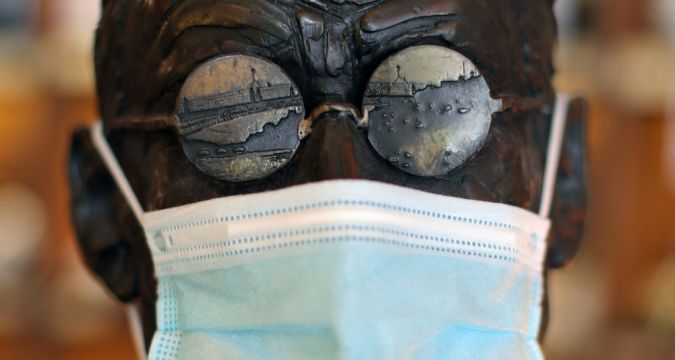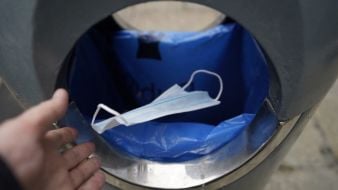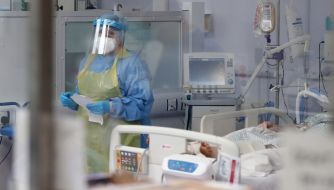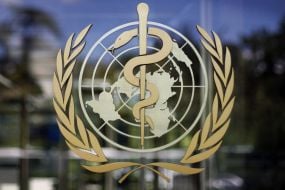Updated: 12.50pm
The general secretary of the Irish Nurses and Midwives Organisation (INMO), Phil Ní Sheaghdha has called for the reintroduction of mandatory mask-wearing in indoor settings.
“The numbers speak for themselves” she told RTÉ radio’s Morning Ireland.
Hospitals were always under pressure after a bank holiday weekend, she said, and combining this with the high levels of Covid-19 in the community, she warned it was a “very unsafe situation”.
The “tremendous pressure” to find space for patients was leading to decisions being made that were “simply unsafe”, she added.
While recent research had indicated that voluntary compliance on mask wearing was two thirds of the population, that needed to be higher as hospitals did not have the capacity for any increase in attendances, she said.
On Monday there were 570 people on trolleys, which is the equivalent of one full acute hospital, Ms Ní Sheaghdha explained.
“We have to look at anything that will assist (in lowering numbers).”
The HSE will have to act as elective care cannot continue when there was no capacity, she cautioned.
Hospital acquired Covid infections had rapidly increased recently from 129 to 183 cases, and hospitals were becoming “reservoirs” for Covid which was leading to cross infection, Ms Ní Sheaghdha said.
Hospital overcrowding
Ms Ní Sheaghdha confirmed there were 660 patients waiting for a bed in hospitals around the country on Tuesday morning, the highest figure since the onset of the pandemic.
"We have seen a 15 per cent increase of patients on trolleys in the last 24 hours with 660 patients for whom there are no beds," a statement from the INMO said.
Ms Ní Sheaghdha called on Minister for Health Stephen Donnelly to intervene and "declare this trolley chaos for what it is - a national emergency".
"A range of measures must be taken now in the short to medium term, including the curtailment of all non-emergency, elective care and the reintroduction of mask wearing in crowded and indoor settings.
"As of this morning, 7,753 patients have been without a bed in our hospitals since the mask requirement was dropped on February 28th," she added.
"ESRI research published today shows that two-thirds of people are still wearing masks on public transport and when shopping. If we could increase this number through a re-introduction of mask wearing, it would help ease transmission numbers.
"Our nurses and midwives are burnt out and exhausted. We can’t expect them to be able to provide safe care in environments that are overcrowded while dealing with a highly transmissible airborne virus."
Testing
Following the calls from the INMO, immunology expert Professor Luke O’Neill said Covid testing facilities should be “ramped up” for the next four to six weeks.
A new variant called BA2 is 30 per cent more infectious than Omicron, which was 70 per cent more transmissible than the previous variant, he told RTÉ Radio’s Today with Claire Byrne show.
The incubation time for BA2 is also shorter, he warned, but the high vaccination rates in Ireland have meant that there is greater protection “otherwise the ICUs would be full.”
Prof O’Neill said Denmark had already experienced the BA2 variant and it was likely the current wave in Ireland would peak in early April before dropping off once again.
Everybody should be “triple vaxed”, he urged, while the vulnerable and over 60s should get a fourth shot.
The 700,000 people who have received their first two vaccines and then contracted the virus should go ahead and get their booster shot, he said. This would give them even better protection and “a durable response”.
There were major developments in the area of vaccines, he added. One, which was made in Scotland, could work against any strain while another was an intranasal vaccine which was very easy to administer, while there were 137 vaccines still in development which will give better protection.

In the meantime, Prof O’Neill joined the INMO in calling for the return of mandatory mask-wearing, particularly on public transport and any indoor situation.
Anything that can be done to reduce pressure on the health system should be done, he said, but added the good news was that summer was coming and the current wave would pass.
However, he warned there remained a risk of a more serious variant which could cause more serious illnesses.
“We should prepare - preparation is key. There will be another outbreak next winter.”







